2022届高三英语二轮复习名词性从句课件(45张ppt)
文档属性
| 名称 | 2022届高三英语二轮复习名词性从句课件(45张ppt) |  | |
| 格式 | zip | ||
| 文件大小 | 921.7KB | ||
| 资源类型 | 教案 | ||
| 版本资源 | 通用版 | ||
| 科目 | 英语 | ||
| 更新时间 | 2022-05-17 16:07:55 | ||
图片预览

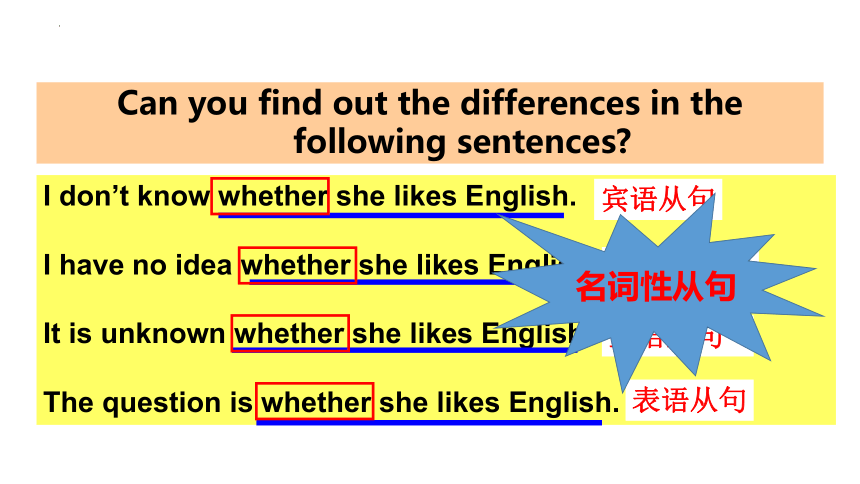

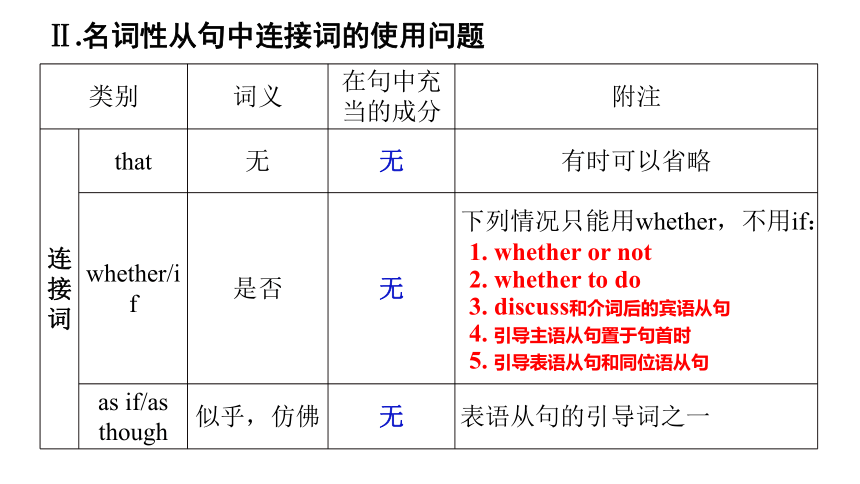
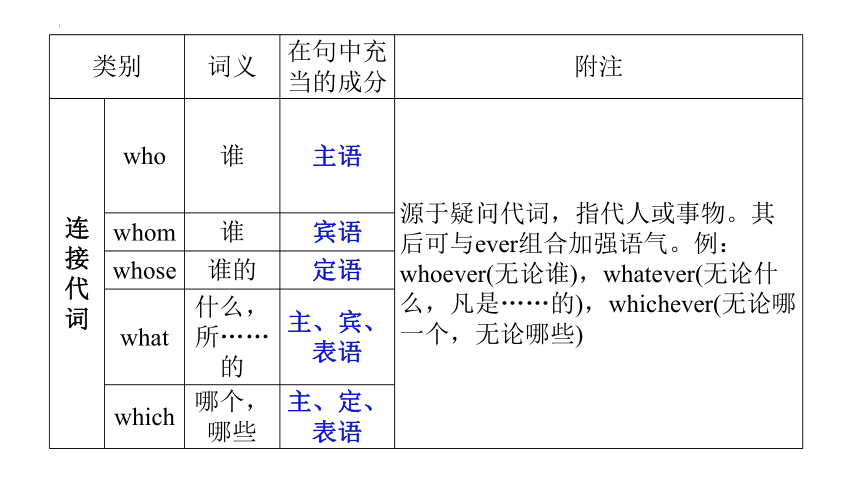
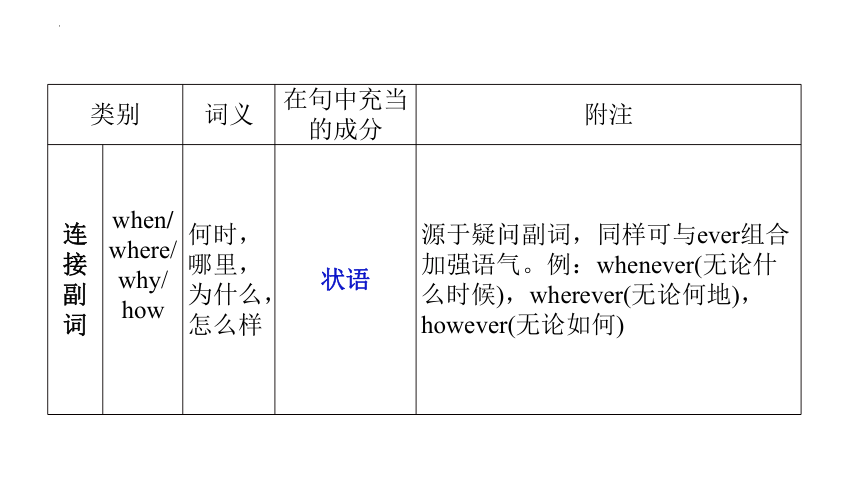

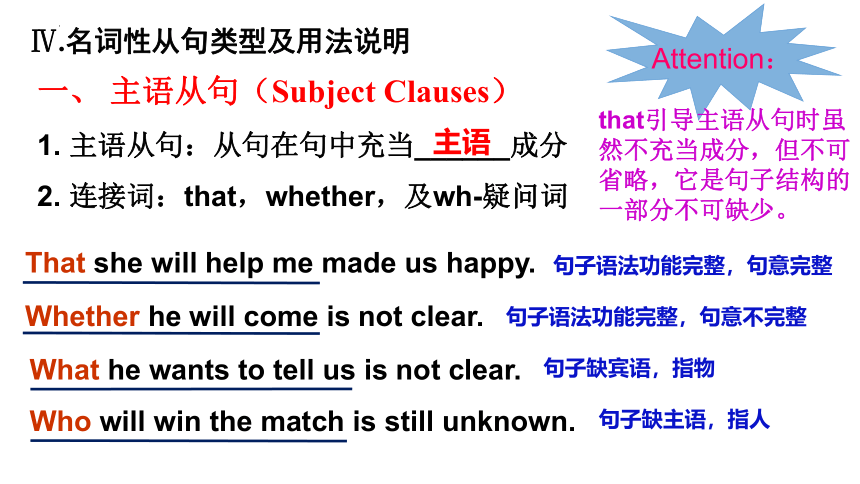
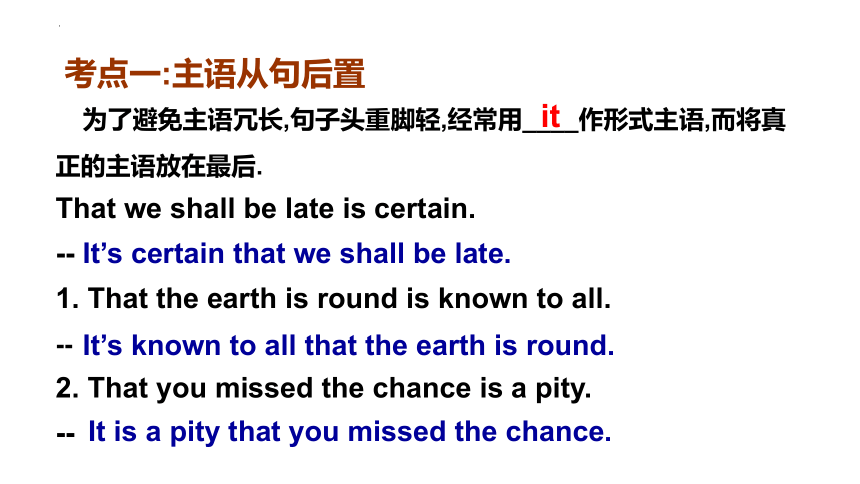

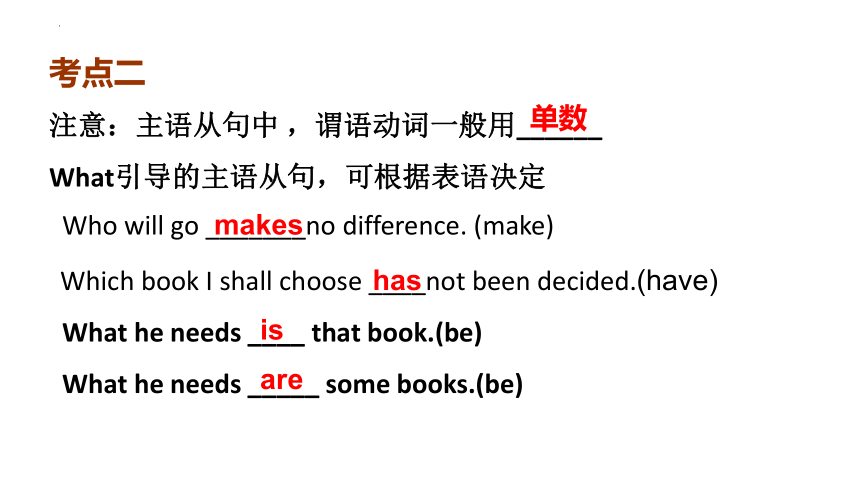
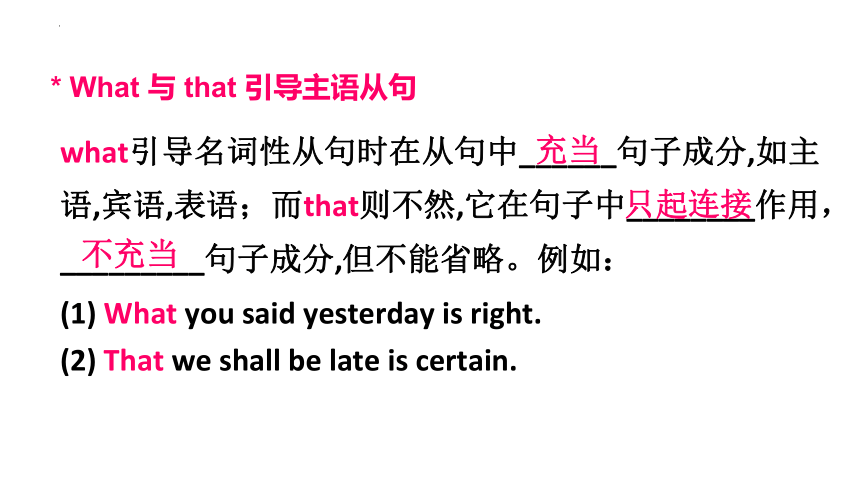
文档简介
(共45张PPT)
名词性从句
Can you find out the differences in the following sentences
I don’t know whether she likes English.
I have no idea whether she likes English.
It is unknown whether she likes English.
The question is whether she likes English.
宾语从句
同位语从句
表语从句
主语从句
名词性从句
Ⅰ. 名词性从句的概念:名词性从句是在句子中起名词作用的句子,它的功能相当于名词词组,在复合句中能担任主语、宾语、表语、同位语、介词宾语等。因此根据它在句中不同的语法功能,名词性从句又可分为主语从句、宾语从句、表语从句和同位语从句。
Ⅱ.名词性从句中连接词的使用问题
类别 词义 在句中充当的成分 附注
连接词 that 无 无 有时可以省略
whether/if 是否 无 下列情况只能用whether,不用if:
as if/as though 似乎,仿佛 无 表语从句的引导词之一
1. whether or not
2. whether to do
3. discuss和介词后的宾语从句
4. 引导主语从句置于句首时
5. 引导表语从句和同位语从句
类别 词义 在句中充当的成分 附注
连接代词 who 谁 主语 源于疑问代词,指代人或事物。其后可与ever组合加强语气。例:whoever(无论谁),whatever(无论什么,凡是……的),whichever(无论哪一个,无论哪些)
whom 谁 宾语
whose 谁的 定语
what 什么,所……的 主、宾、表语
which 哪个,哪些 主、定、表语
类别 词义 在句中充当的成分 附注
连接副词 when/where/why/ how 何时,哪里, 为什么, 怎么样 状语 源于疑问副词,同样可与ever组合加强语气。例:whenever(无论什么时候),wherever(无论何地),however(无论如何)
Ⅲ.名词性从句做题方法
从句缺什么补什么
缺主语、宾语、表语用
what /who(人)
缺状语
时间 when 缺地点where 原因why 怎样如何用how
不缺成分
1. 没有词义,用 that
2. 译为“是否”,用 whether/if
Ⅳ.名词性从句类型及用法说明
一、 主语从句(Subject Clauses)
1. 主语从句:从句在句中充当______成分
主语
2. 连接词:that,whether,及wh-疑问词
That she will help me made us happy.
Whether he will come is not clear.
What he wants to tell us is not clear.
Who will win the match is still unknown.
Attention:
that引导主语从句时虽然不充当成分,但不可省略,它是句子结构的一部分不可缺少。
句子语法功能完整,句意完整
句子语法功能完整,句意不完整
句子缺宾语,指物
句子缺主语,指人
考点一:主语从句后置
为了避免主语冗长,句子头重脚轻,经常用____作形式主语,而将真正的主语放在最后.
That we shall be late is certain.
-- It’s certain that we shall be late.
1. That the earth is round is known to all.
--
2. That you missed the chance is a pity.
--
It is a pity that you missed the chance.
It’s known to all that the earth is round.
it
It 的用法: (形式主语)
It’ s possible/important/necessary/clear that…
…很可能/重要的是…/必要的是…/很清楚…
It’s said/ reported that..据说/据报道…
It’s been announced/declared that..已经通知/宣布…
It seems/appears/happens that…显然、明显、碰巧..
It’s no wonder that…并不奇怪/无疑…
It’s a pity/a fact /a common knowledge (众所周知) that....
考点二
注意:主语从句中 ,谓语动词一般用______
What引导的主语从句,可根据表语决定
What he needs ____ that book.(be)
What he needs _____ some books.(be)
单数
is
are
Who will go _______no difference. (make)
Which book I shall choose ____not been decided.(have)
makes
has
what引导名词性从句时在从句中______句子成分,如主语,宾语,表语;而that则不然,它在句子中________作用,_________句子成分,但不能省略。例如:
(1) What you said yesterday is right.
(2) That we shall be late is certain.
* What 与 that 引导主语从句
充当
只起连接
不充当
二、宾语从句(Object Clauses)
1. 宾语从句的概念:
宾语从句在复合句中作主句的______。
2. 句子结构:
主句+______________+_________
宾语
连词(引导词)
宾语从句
3. 连接词:
当宾语从句是陈述句时(包括肯定句和否定句), 由that引导(可省)
当宾语从句是一般疑问句时,由连词 whether或if引导
当宾语从句是特殊疑问句时,由连接代词(what, who, whom, which, whose)或连接副词(when, where, why, how)引导
He has told me that he will go to Shanghai tomorrow.
He asked whether /if I would show him the way.
I don’t know what you want.
I will give the honor to whoever will volunteer to cooperate with us.
I just can’t tell you who will volunteer to help us.
句子语法功能完整,句意完整
句子语法功能完整,句意不完整
句子缺主语,指人
句子缺宾语,指物
* who与whoever的用法有什么区别呢?
* what, whatever, who, whoever等引导的名词性从句
Whatever=anything that=no matter what
Whoever=anyone who=no matter who
Whenever=any time=no matter when
Wherever=any place=no matter where
无论什么
无论谁
无论何时
无论何地
泛指
what、who、when、where则是特指。
Who spoke at the meeting is unknown.
The person that/who spoke at the meeting
is unknown.
Whoever breaks the law will be punished.
Anyone who breaks the law will be punished.
注意:
1.whatever、whoever、whenever、wherever
等常引导主语从句、宾语或表语从句,也可
引导状语从句,等于“no matter+疑问词”。
2.此类从句不能用it做形式主语来代替。
3.no matter+疑问代词,不能引导名词性从句。
要点一:宾语从句中的连接词that在以下三种情况下不能省略
(1)当that 从句与另一名词性从句并列作宾语时,第二个that不能省;
(2)当that作介词宾语时,that不可省掉。
(3)用it做形式宾语的宾语从句
Everyone knew what happened and that she was worried.
The reason lies in that she works harder than the others do.
I think it necessary that you should read English aloud.
* 宾语从句注意要点
要点二:宾语从句的时态
1. 如果主句是现在的时态 (包括一般现在时 ,现在进行时,现在完成时),从句的时态可根据_________而定,(包括一般现在时,一般过去时,一般将来时,现在完成时等)
I know he _______(live)here .
I know he _______(live)here ten years ago .
I have heard that he ___________ (come) tomorrow .
实际情况
lives
lived
will come
2.如果主句是过去的时态(包括一般过去时,过去进行时),那么从句的时态一定要用相对应的_____的某种时态(包括一般过去时,过去进行时,过去将来时, 过去完成时)
I knew who ______(live) here.
I saw she __________(talk) with her mother.
He asked whether his father ____________(come)
back tomorrow.
He said that he __________(see) it .
过去
lived
was talking
would come
had seen
3.当从句是客观真理,定义,公理,定理
时用_____________。
The teacher said that the earth ________
(travel) around the sun.
一般现在时
travels
宾语从句的语序用______语序:
________+______+______+其他成分
连接词
主语
要点三: 宾语从句的语序
陈述
谓语
1. When will he go to the library
His brother asks when he will go to the library .
His brother asks when will he go to the library .
2. What does he want to buy
I don’t know what he wants to buy .
I don’t know what does he want to buy .
it常可以放在动词think, find, consider, believe, feel, make等后作为形式宾语而真正的宾语-that从句则放在句尾.
I don’t think it right that you cheat in the exam.
I found it difficult that I told lies to him.
要点四: it做形式宾语
要点五: 虚拟语气
insist, order, comman, suggest, advise, propose, recommend, ask, demand, request, require, urge, desire等动词后的宾语从句须用虚拟语气,即:(should) do/(should) be done的形式。
He asked that we (should) get there before nine o’clock. 他要求我们在九点钟之前赶到那儿。
He ordered that it (should) be sent back. 他命令把它送回去。
若主语为_____谓语动词为think, consider, suppose, believe, expect, guess, imagine等,其后的宾语从句若含有否定意义,一般要把否定词转移到主句谓语上,从句谓语用肯定式,即 ____________________________。
I/We
I don’t think/believe/ …+肯定句
We don’t think you are here.
I don't believe he will do so.
要点六: 否定转移
我们认为你不在这。
我相信他不会这样做。
if 引导的宾从和状从 If的 意义 时态 例句
主+谓(vt) +if +从句 I don’t know if he will come tomorrow.
主句(将)+if +从句(现) I will call you if he comes tomorrow.
* 注意:if引导的宾语从句和条件状语从句的区别
是否
(宾从)
一般将来时
如果
(状从)
主将
从现
注意:when引导的宾语从句和时间状语从句的区别
when引导的宾从和状从 从句 类型 时态 例句
主+谓(vt) +when +从句 He asks me when I will arrive tomorrow.
主句(将)+when +从句(现) I will call you when he arrives tomorrow.
宾从
状从
一般将来时
主将
从现
三、表语从句(Predicative Clauses)
1. 表语从句是在复合句中作_______的名词性从句, 放在______之后。
表语
系动词
2. 结构
主语+系动词+表语从句
3. 连接词
连接词:that / whether /as if /as though
连接代词:who / whom / whose / which / what
连接副词:when / where / why / how / because
( if 不引导表语从句)
1.My idea is that we should do it right away.
我的意见是马上就干。
2.That is what he meant. 这就是他的意思。
3.The problem is how we can find him. 问题是我们如何找到他。
4.The morning is when I’m busiest. 早上是我最忙的时候。
5.That’s where you are wrong. 这就是你不对的地方。
6.That’s why he didn’t come. 这就是他没有来的缘故。
另外,表语从句还可以用as if, as though, because等来引导。
如: 1.It is because he is too foolish. 那是因为他太蠢了。
2.It is not as though we were poor. 又不是我们家里穷。
注 意
在表语从句中,表“是否” 时,只能用 “whether”不能用“If”。
一般情况下,“that”不能省。
It is /was because ….
It is /was why….
3. The reason (why…/for…)is /was that….
4 The reason is because /why…
that ….
* 名词主语+be+that引导的表语从句
在这种句型中,常用表示事实,真理的名词,如:fact, truth 或表示看法,观点的名词,如: idea, opinion, belief, view, feeling, suggestion, plan等作主语。
1.The fact is that our team has won the game.
2.The truth is that she was the very person who informed against her husband.
1. 概念
同位语从句在句中充当_______成分,其一般跟在一些抽象名词( idea; belief; fact; truth; problem; news等) 后面,对名词作进一步_________.
四、同位语从句(Appositive Clauses)
2. 引导词
同位语从句常用 that引导或用when / where/ why / how / whether / what 来引导
同位语
解释说明
n. + 连接词 + 从句
1. 同位语从句多用that引导
2. 在have no idea 之后常用wh-引导同位语从句.
I have no idea where he has gone.
I have no idea when he did it.
I have no idea what he did.
The news that they won the match is true.
I have heard the news that he visited our factory .
I have heard the news that he told you the other day .
同位语从句和定语从句的区别:
1. 同位语从句——that只起连接作用,不作任何成分
定语从句——that是关系代词,起连接作用和充当主语、宾语和表语
2. 同位语从句——同位语从句和前面的名词是同位关系,
对名词进行补充说明
定语从句 ——定从和前面的名词是所属关系,
对名词进行修饰,加以限定
3. 同位语从句——that不能省
定语从句 ——that在从句中作宾语时,可以省
1.The news that there are no lives on the moon is known to us all. ( )
2.The news that you heard is not true.
( )
3.The fact that she works hard is well known to us all.
( )
4.They expressed the hope that they would come to visit China again. ( )
5.The hope that she expressed is that they would come to visit China again. ( )
同位语从句
定语从句
同位语从句
同位语从句
定语从句
Practice :判断下列各句是同位语从句还是定语从句
名词性从句的引导词
A.本身无词义,不担当任何语法成分
B.本身有词义,但不担当任何语法成分
C.本身有词义,担当语法成分
D. as if, as thought 引导表语从句
that
whether/ if
连接代词 what, which, who, whom, whose, whatever, whichever, whoever等
连接副词 when, where, why, how等
Summary
高考真题演练
1
2
3
4
5
6
7
THANK YOU !
名词性从句
Can you find out the differences in the following sentences
I don’t know whether she likes English.
I have no idea whether she likes English.
It is unknown whether she likes English.
The question is whether she likes English.
宾语从句
同位语从句
表语从句
主语从句
名词性从句
Ⅰ. 名词性从句的概念:名词性从句是在句子中起名词作用的句子,它的功能相当于名词词组,在复合句中能担任主语、宾语、表语、同位语、介词宾语等。因此根据它在句中不同的语法功能,名词性从句又可分为主语从句、宾语从句、表语从句和同位语从句。
Ⅱ.名词性从句中连接词的使用问题
类别 词义 在句中充当的成分 附注
连接词 that 无 无 有时可以省略
whether/if 是否 无 下列情况只能用whether,不用if:
as if/as though 似乎,仿佛 无 表语从句的引导词之一
1. whether or not
2. whether to do
3. discuss和介词后的宾语从句
4. 引导主语从句置于句首时
5. 引导表语从句和同位语从句
类别 词义 在句中充当的成分 附注
连接代词 who 谁 主语 源于疑问代词,指代人或事物。其后可与ever组合加强语气。例:whoever(无论谁),whatever(无论什么,凡是……的),whichever(无论哪一个,无论哪些)
whom 谁 宾语
whose 谁的 定语
what 什么,所……的 主、宾、表语
which 哪个,哪些 主、定、表语
类别 词义 在句中充当的成分 附注
连接副词 when/where/why/ how 何时,哪里, 为什么, 怎么样 状语 源于疑问副词,同样可与ever组合加强语气。例:whenever(无论什么时候),wherever(无论何地),however(无论如何)
Ⅲ.名词性从句做题方法
从句缺什么补什么
缺主语、宾语、表语用
what /who(人)
缺状语
时间 when 缺地点where 原因why 怎样如何用how
不缺成分
1. 没有词义,用 that
2. 译为“是否”,用 whether/if
Ⅳ.名词性从句类型及用法说明
一、 主语从句(Subject Clauses)
1. 主语从句:从句在句中充当______成分
主语
2. 连接词:that,whether,及wh-疑问词
That she will help me made us happy.
Whether he will come is not clear.
What he wants to tell us is not clear.
Who will win the match is still unknown.
Attention:
that引导主语从句时虽然不充当成分,但不可省略,它是句子结构的一部分不可缺少。
句子语法功能完整,句意完整
句子语法功能完整,句意不完整
句子缺宾语,指物
句子缺主语,指人
考点一:主语从句后置
为了避免主语冗长,句子头重脚轻,经常用____作形式主语,而将真正的主语放在最后.
That we shall be late is certain.
-- It’s certain that we shall be late.
1. That the earth is round is known to all.
--
2. That you missed the chance is a pity.
--
It is a pity that you missed the chance.
It’s known to all that the earth is round.
it
It 的用法: (形式主语)
It’ s possible/important/necessary/clear that…
…很可能/重要的是…/必要的是…/很清楚…
It’s said/ reported that..据说/据报道…
It’s been announced/declared that..已经通知/宣布…
It seems/appears/happens that…显然、明显、碰巧..
It’s no wonder that…并不奇怪/无疑…
It’s a pity/a fact /a common knowledge (众所周知) that....
考点二
注意:主语从句中 ,谓语动词一般用______
What引导的主语从句,可根据表语决定
What he needs ____ that book.(be)
What he needs _____ some books.(be)
单数
is
are
Who will go _______no difference. (make)
Which book I shall choose ____not been decided.(have)
makes
has
what引导名词性从句时在从句中______句子成分,如主语,宾语,表语;而that则不然,它在句子中________作用,_________句子成分,但不能省略。例如:
(1) What you said yesterday is right.
(2) That we shall be late is certain.
* What 与 that 引导主语从句
充当
只起连接
不充当
二、宾语从句(Object Clauses)
1. 宾语从句的概念:
宾语从句在复合句中作主句的______。
2. 句子结构:
主句+______________+_________
宾语
连词(引导词)
宾语从句
3. 连接词:
当宾语从句是陈述句时(包括肯定句和否定句), 由that引导(可省)
当宾语从句是一般疑问句时,由连词 whether或if引导
当宾语从句是特殊疑问句时,由连接代词(what, who, whom, which, whose)或连接副词(when, where, why, how)引导
He has told me that he will go to Shanghai tomorrow.
He asked whether /if I would show him the way.
I don’t know what you want.
I will give the honor to whoever will volunteer to cooperate with us.
I just can’t tell you who will volunteer to help us.
句子语法功能完整,句意完整
句子语法功能完整,句意不完整
句子缺主语,指人
句子缺宾语,指物
* who与whoever的用法有什么区别呢?
* what, whatever, who, whoever等引导的名词性从句
Whatever=anything that=no matter what
Whoever=anyone who=no matter who
Whenever=any time=no matter when
Wherever=any place=no matter where
无论什么
无论谁
无论何时
无论何地
泛指
what、who、when、where则是特指。
Who spoke at the meeting is unknown.
The person that/who spoke at the meeting
is unknown.
Whoever breaks the law will be punished.
Anyone who breaks the law will be punished.
注意:
1.whatever、whoever、whenever、wherever
等常引导主语从句、宾语或表语从句,也可
引导状语从句,等于“no matter+疑问词”。
2.此类从句不能用it做形式主语来代替。
3.no matter+疑问代词,不能引导名词性从句。
要点一:宾语从句中的连接词that在以下三种情况下不能省略
(1)当that 从句与另一名词性从句并列作宾语时,第二个that不能省;
(2)当that作介词宾语时,that不可省掉。
(3)用it做形式宾语的宾语从句
Everyone knew what happened and that she was worried.
The reason lies in that she works harder than the others do.
I think it necessary that you should read English aloud.
* 宾语从句注意要点
要点二:宾语从句的时态
1. 如果主句是现在的时态 (包括一般现在时 ,现在进行时,现在完成时),从句的时态可根据_________而定,(包括一般现在时,一般过去时,一般将来时,现在完成时等)
I know he _______(live)here .
I know he _______(live)here ten years ago .
I have heard that he ___________ (come) tomorrow .
实际情况
lives
lived
will come
2.如果主句是过去的时态(包括一般过去时,过去进行时),那么从句的时态一定要用相对应的_____的某种时态(包括一般过去时,过去进行时,过去将来时, 过去完成时)
I knew who ______(live) here.
I saw she __________(talk) with her mother.
He asked whether his father ____________(come)
back tomorrow.
He said that he __________(see) it .
过去
lived
was talking
would come
had seen
3.当从句是客观真理,定义,公理,定理
时用_____________。
The teacher said that the earth ________
(travel) around the sun.
一般现在时
travels
宾语从句的语序用______语序:
________+______+______+其他成分
连接词
主语
要点三: 宾语从句的语序
陈述
谓语
1. When will he go to the library
His brother asks when he will go to the library .
His brother asks when will he go to the library .
2. What does he want to buy
I don’t know what he wants to buy .
I don’t know what does he want to buy .
it常可以放在动词think, find, consider, believe, feel, make等后作为形式宾语而真正的宾语-that从句则放在句尾.
I don’t think it right that you cheat in the exam.
I found it difficult that I told lies to him.
要点四: it做形式宾语
要点五: 虚拟语气
insist, order, comman, suggest, advise, propose, recommend, ask, demand, request, require, urge, desire等动词后的宾语从句须用虚拟语气,即:(should) do/(should) be done的形式。
He asked that we (should) get there before nine o’clock. 他要求我们在九点钟之前赶到那儿。
He ordered that it (should) be sent back. 他命令把它送回去。
若主语为_____谓语动词为think, consider, suppose, believe, expect, guess, imagine等,其后的宾语从句若含有否定意义,一般要把否定词转移到主句谓语上,从句谓语用肯定式,即 ____________________________。
I/We
I don’t think/believe/ …+肯定句
We don’t think you are here.
I don't believe he will do so.
要点六: 否定转移
我们认为你不在这。
我相信他不会这样做。
if 引导的宾从和状从 If的 意义 时态 例句
主+谓(vt) +if +从句 I don’t know if he will come tomorrow.
主句(将)+if +从句(现) I will call you if he comes tomorrow.
* 注意:if引导的宾语从句和条件状语从句的区别
是否
(宾从)
一般将来时
如果
(状从)
主将
从现
注意:when引导的宾语从句和时间状语从句的区别
when引导的宾从和状从 从句 类型 时态 例句
主+谓(vt) +when +从句 He asks me when I will arrive tomorrow.
主句(将)+when +从句(现) I will call you when he arrives tomorrow.
宾从
状从
一般将来时
主将
从现
三、表语从句(Predicative Clauses)
1. 表语从句是在复合句中作_______的名词性从句, 放在______之后。
表语
系动词
2. 结构
主语+系动词+表语从句
3. 连接词
连接词:that / whether /as if /as though
连接代词:who / whom / whose / which / what
连接副词:when / where / why / how / because
( if 不引导表语从句)
1.My idea is that we should do it right away.
我的意见是马上就干。
2.That is what he meant. 这就是他的意思。
3.The problem is how we can find him. 问题是我们如何找到他。
4.The morning is when I’m busiest. 早上是我最忙的时候。
5.That’s where you are wrong. 这就是你不对的地方。
6.That’s why he didn’t come. 这就是他没有来的缘故。
另外,表语从句还可以用as if, as though, because等来引导。
如: 1.It is because he is too foolish. 那是因为他太蠢了。
2.It is not as though we were poor. 又不是我们家里穷。
注 意
在表语从句中,表“是否” 时,只能用 “whether”不能用“If”。
一般情况下,“that”不能省。
It is /was because ….
It is /was why….
3. The reason (why…/for…)is /was that….
4 The reason is because /why…
that ….
* 名词主语+be+that引导的表语从句
在这种句型中,常用表示事实,真理的名词,如:fact, truth 或表示看法,观点的名词,如: idea, opinion, belief, view, feeling, suggestion, plan等作主语。
1.The fact is that our team has won the game.
2.The truth is that she was the very person who informed against her husband.
1. 概念
同位语从句在句中充当_______成分,其一般跟在一些抽象名词( idea; belief; fact; truth; problem; news等) 后面,对名词作进一步_________.
四、同位语从句(Appositive Clauses)
2. 引导词
同位语从句常用 that引导或用when / where/ why / how / whether / what 来引导
同位语
解释说明
n. + 连接词 + 从句
1. 同位语从句多用that引导
2. 在have no idea 之后常用wh-引导同位语从句.
I have no idea where he has gone.
I have no idea when he did it.
I have no idea what he did.
The news that they won the match is true.
I have heard the news that he visited our factory .
I have heard the news that he told you the other day .
同位语从句和定语从句的区别:
1. 同位语从句——that只起连接作用,不作任何成分
定语从句——that是关系代词,起连接作用和充当主语、宾语和表语
2. 同位语从句——同位语从句和前面的名词是同位关系,
对名词进行补充说明
定语从句 ——定从和前面的名词是所属关系,
对名词进行修饰,加以限定
3. 同位语从句——that不能省
定语从句 ——that在从句中作宾语时,可以省
1.The news that there are no lives on the moon is known to us all. ( )
2.The news that you heard is not true.
( )
3.The fact that she works hard is well known to us all.
( )
4.They expressed the hope that they would come to visit China again. ( )
5.The hope that she expressed is that they would come to visit China again. ( )
同位语从句
定语从句
同位语从句
同位语从句
定语从句
Practice :判断下列各句是同位语从句还是定语从句
名词性从句的引导词
A.本身无词义,不担当任何语法成分
B.本身有词义,但不担当任何语法成分
C.本身有词义,担当语法成分
D. as if, as thought 引导表语从句
that
whether/ if
连接代词 what, which, who, whom, whose, whatever, whichever, whoever等
连接副词 when, where, why, how等
Summary
高考真题演练
1
2
3
4
5
6
7
THANK YOU !
